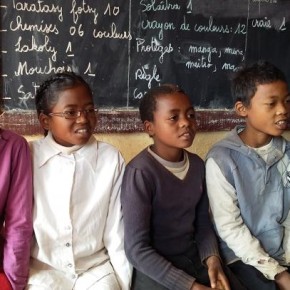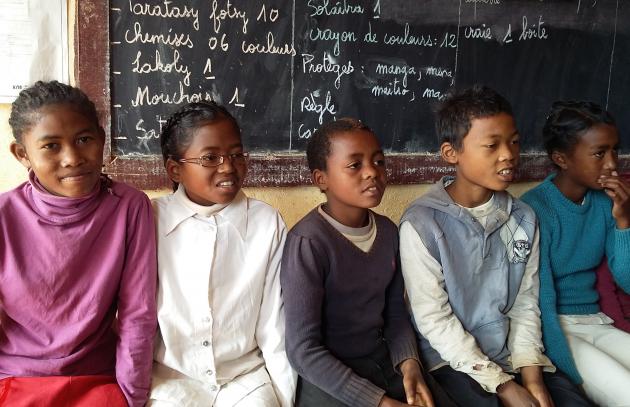
07 march 2016, IIEP
Durante la 60ª Convención Anual y la Conferencia Internacional de Educación,
desarrollada en Vancouver, Canadá en días pasados (del 6 al 10 de marzo de
2016), el investigador Candy Lugaz ofreció una investigación basada en
la política de la subvenciones escolares, en la que destacó que, la mayoría
de los países que han implementado estas políticas escolares provenientes
de los fondos de las autoridades centrales, para dar a las escuelas mayor
autonomía al momento de administrar sus finanzas, no necesariamente se
garantiza el hecho de mejorar o lograr grandes avances en torno a la
equidad en la educación. La estudio piloto que comenzó en Lesotho en el
2010, ha abarcado otros países y regiones: el Sur y Este de África, África
francófana, Asia Oriental y el Pacífico y América Latina y el Caribe,
llegando a casi 200 escuelas coordinado por el IIPE y con alianza de
UNICEF, la Alianza Mundial para la Educación, los Ministerios de Educación
y algunos institutos de investigación nacional. En este sentido, el
programa para una enseñanza gratuita y el fortalecimiento de la autonomía
en las escuelas, persigue alcanzar los objetivos de la educación para
todos, como parte del Programa Dakar y Educación 2.030, que expresa el
acceso a la educación, la reducción de las disparidades, mejorar la calidad
y la gestión en las escuelas, pero en su implementación, también pueden
surgir una serie de problemas que ´puede generar la no cristalización de
los objetivos. Para ello, el investigador viene evaluando, a través de
estudios comparados entre los países que han acoplado la política de
subvenciones, dando seguimiento algunos aspectos claves como: el proceso de
formulación de la política, su difusión, la financiación, el método de
distribución a las escuelas, la utilización de las subvenciones por parte
de las escuelas y la evaluación de todo lo anterior a los diferentes
contextos económicos, políticos y sociales de cada país. Con esta
investigación se pretende elaborar a futuro una guía técnica dirigida a los
ministerios de educación con el fin de asegurar el éxito en el diseño, la
implementación y la reforma de la política de subvención escolar.
Live from CIES 2016: How do school grants impact equity?
In recent years, a growing number of developing countries have implemented
school grant policies where local schools directly receive funding from the
central authorities. The results: schools have more autonomy and
unprecedented say in how their finances are managed.
While the fundamental objective of these policies is to improve equity so
all children – even the poorest – are able to attend and learn in school,
the mere existence of school grant policies does not guarantee that this
will be achieved. Over the past six years, IIEP and its partners have been
engaged in a major study looking at the use and usefulness of school grant
policies.
During the 60th annual Comparative and International Education Society
(CIES) conference in Vancouver, Canada, from 6-10
March 2016, a panel was dedicated to the project’s latest findings and key
suggestions for making these policies stronger. IIEP school grants project
coordinator, Candy Lugaz ,
provides insight from CIES.
*IIEP first began studying school grant policies in 2010. Can you speak to
the evolution of this project since the first countries were selected?*
*Candy Lugaz:* The project first started as a pilot study in Lesotho in
2010, with just a small number of schools (seven!). It has since grown
progressively to cover more countries and different regions. We have now
worked in four regions (Southern and Eastern Africa, Francophone Africa,
East Asia and the Pacific, and Latin America and the Caribbean), reaching
nearly 200 schools. Coordinated by IIEP, the project has been implemented
in collaboration with key partners such as UNICEF ,
the Global Partnership for Education ,
ministries of education and national research institutes. Such
collaboration is a cornerstone of its success.
The interest of these partners, which allowed the project to develop, is
certainly explained by the fact that school grant policies are promising
ones to achieve the goals of education for all, as part of the Dakar agenda
and Education 2030, which covers access to education, reducing disparities,
and improving quality, school management, and more. Many countries
implemented these policies to support free education and empower schools.
However, there are a number of challenges that can arise out of their
design and implementation, which can block the full realization of these
objectives. This research program is designed to specifically identify and
understand these barriers and to deliver technical and political solutions.
*Today, a total of 14 countries and 200 schools have been studied. How have
the research questions evolved during this time?*
*Candy Lugaz:* Our research aims to examine the design and implementation
of school grants policies by examining several key aspects: their
objectives, the policy’s formulation and dissemination process, funding
formulas and distribution methods to the schools, as well as the use of
grants by the schools, decision-making mechanisms within schools, the
management and monitoring of the use of grants, and lastly, the
contribution subsidies can make to access, quality, and school management.
We intentionally used the same analytical framework during our research in
different countries, which was used as a grid of comparative policy
analysis. This allowed us to analyze these complex policies in depth and
look at its implementation in different contexts and to identify the
similarities and differences that arise in terms of design and
implementation. This framework and associated research tools were discussed
with each country team to ensure their validity according to each national
context.
It’s the million dollar question perhaps, but to what extent did you find
from this panel – and the research at large – that school grant policies
can play a positive role in achieving Education 2030?
Candy Lugaz: As mentioned earlier, school grant policies are promising
policies to achieve the objectives of the Education 2030 agenda. To
compensate for the abolition of school fees, they can contribute to
increasing school access, as was the case in most countries surveyed. They
can also help set an appropriate funding formula, in which more resources
are transferred to schools and students with special needs (such as small
schools in rural areas, orphans, or students with special needs) and can
help resolve disparities between both schools and students. Finally, it can
give schools the opportunity to decide for themselves how to use these
subsidies, which can enable more informed choices based on their actual
needs, increased participation from everyone involved in the decision
process, and can stimulate school-community partnerships.
But they are complex policies. Many problems can arise in their
implementation and can hinder the full realization of these objectives.
Particular attention must be paid to the design process and implementation
in order to ensure the success of these policies.
What are the next steps in further studying and refining school grant
policies?
Candy Lugaz: Research is currently taking place in four French-speaking
countries (Haiti, the Democratic Republic of Congo, Togo and Madagascar),
in collaboration with the Global Partnership for Education, as part of the
Global and Regional Activities Programme. A policy seminar will be
organized during the summer of 2016 to discuss the results of this
research. We will publish several products, including a comparative
analysis of policies developed in the four countries, national reports and
guidance notes in different formats to meet the information needs on this
issue for different audiences (decision makers, technical and financial
partners, administrators, researchers, schools and the community at large).
We are also finalizing a film on this subject, which will illustrate in
another media, the rich lessons from this research and disseminate it to a
wider audience.
Furthermore, we are preparing a technical guide for the ministries of
education and development partners, which identifies, based on the results
of extensive research conducted over the past six years, the key points to
consider to ensure success when designing, implementing and reforming
school grant policies.
Para ampliar la información:
www.iiep.unesco.org/en/live-cies-2016-how-do-school-grants-impact-equity-3462
http://www.slideshare.net/IIEP_UNESCO/school-grants-from-a-promising-to-a-successful-policy








 Users Today : 18
Users Today : 18 Total Users : 35460321
Total Users : 35460321 Views Today : 22
Views Today : 22 Total views : 3419050
Total views : 3419050